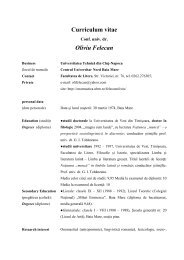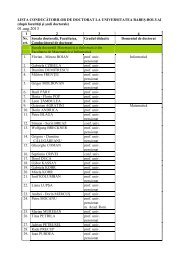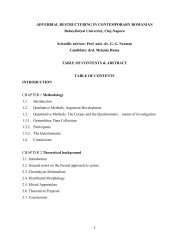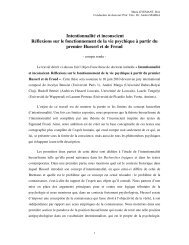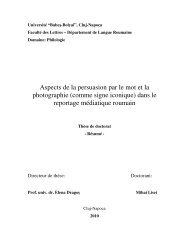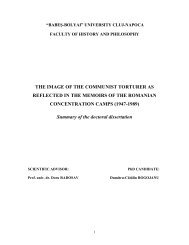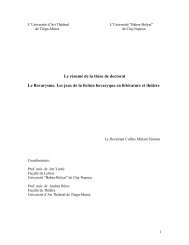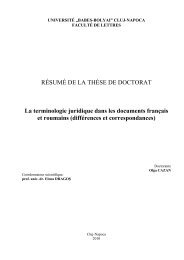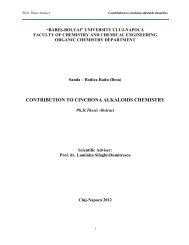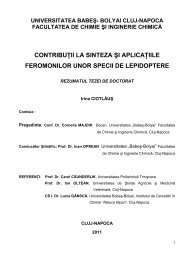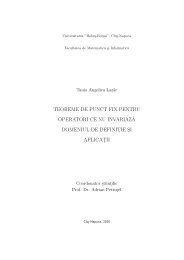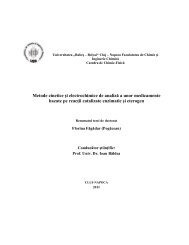Contemporary debates concerning the axiology of democracy
Contemporary debates concerning the axiology of democracy
Contemporary debates concerning the axiology of democracy
You also want an ePaper? Increase the reach of your titles
YUMPU automatically turns print PDFs into web optimized ePapers that Google loves.
moral laws which are subject to. The result <strong>of</strong> <strong>the</strong>se <strong>the</strong>ories is <strong>the</strong> conclusion that all people be<br />
treated equally.<br />
The term "equality" should be read in conjunction i in itself to identify its correct meaning.From<br />
Aristotle issue was still relevant cases, saying <strong>the</strong> policy he (1282, b): "Persons who are equal<br />
should be equal part (...). But in what respect <strong>the</strong> equal and unequal? ". Aristotle's conception,<br />
<strong>the</strong> criterion for differentiating between relevant and irrelevant bases is <strong>the</strong> determination <strong>of</strong><br />
human virtue which he deserves some good.<br />
There are, <strong>of</strong> course, some areas almost unanimously recognized that equality is clearly<br />
evident.Thus it is not controversial legal equality before <strong>the</strong> law, political equality and equality<br />
in human rights, civilian or <strong>the</strong> moral. Major <strong>debates</strong> in <strong>the</strong> field related to economic equality<br />
and social views are specific major political ideologies.<br />
This brings me to <strong>the</strong> conflict between equality and freedom and I argued that social<br />
and economic equalization automatically implies a restriction <strong>of</strong> freedom.Yet reality shows us<br />
that equality as mere absence <strong>of</strong> discrimination, contravenes one is incapable <strong>of</strong> emergence <strong>of</strong><br />
social conflicts, and any political <strong>the</strong>ory must be reported to practical reality. Practice tells us<br />
that pure liberalism is insufficient, and <strong>the</strong> corollary <strong>of</strong> this statement is that however we must<br />
start from <strong>the</strong> liberal views that adapt to <strong>the</strong> realities <strong>of</strong> life.<br />
Any good political order must have as one <strong>of</strong> its fundamental principles <strong>of</strong> justice.His<br />
company went so far right was synonymous with a good company, which is a dangerous<br />
exaggeration.<br />
To illustrate <strong>the</strong> problem <strong>of</strong> justice will make a parallel between how this concept is reflected by<br />
two authors representative <strong>of</strong> contemporary political philosophy, John Rawls in his A Theory <strong>of</strong><br />
justice (1971) and Robert Nozick in Anarchy, State and Utopia (1974).Both authors consider<br />
that <strong>the</strong> company relies on some principles variable not defined on what a good life means. In<br />
<strong>the</strong>ir <strong>the</strong>ory, <strong>the</strong> law is mainly good. Differences that separate <strong>the</strong>m resulting from <strong>the</strong>ir ideas on<br />
how to configure <strong>the</strong> distribution company and <strong>the</strong> economic and social goods.<br />
Regarding individual rights should consider a presentation <strong>of</strong> <strong>the</strong> concept <strong>of</strong> Ronald<br />
Dworkin, as a leading modern <strong>the</strong>orists <strong>of</strong> rights.So he asks if we have a right to liberty? Thomas



